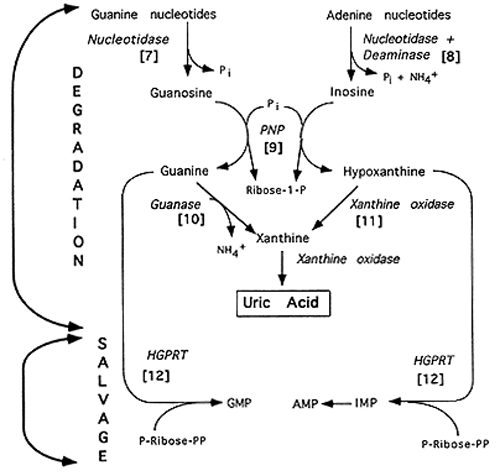Hello everyone, this is my first post, although I am a longtime "lurker". I haven't posted anything until now because, to be honest, most of the interesting problems and queries which appear in the threads on this board are addressed so competently that I felt like I had little of value to add.
However, I would like to point out that I believe I am on to something interesting with regards to the DHA, Uridine, Choline combo (AKA "Gerbil diet"). I took this stack for about 2 weeks, one month ago, and noticed some benefit, but not to the level which some here seemed to be describing, or indeed, that the studies seemed to imply. About a week and a half ago, I restarted the combo, deciding to stick to it because I reasoned that it was probably doing me good despite the lack of overt effects. The first few days, everything was as it had been during my first go at this stack: slightly increased energy, slightly increased concentration facility, slightly increased <insert parameter which the Gerbil Diet is supposed to help with>.
About 4 days ago, I decided after many hours of research to start supplementing my diet with Flavonoids, and began drinking a concoction of raw Cacao powder and Grape Seed Extract. I began to notice, that same day, that every time I took the Gerbil Combo (which is twice per day, morning and evening), the effects seemed very powerful, to the point where I was noticing it very strongly: a pronounced sens of well-being (not "euphoric", more "adiaphoretic" [gotta love those Greek words]), mental clarity, social "reasoning" (i.e. understanding and acting upon social cues with greater ease, speed and accuracy), and greater impulse control. In other words, it had a very strong normalizing effect, where "normal" became a high level equilibrium which was more difficult to disturb, comparatively, than my previous "baseline" state.
I was convinced that the Flavonoids had something to do with it, since the change occurred simultaneously, and there were no other noticeable modifications to my daily life which could account for such a dramatic and sudden jump in the quality of the effects of the Gerbil Combo. Today, I stumbled across the following study:
Dietary flavonoids increase plasma very long-chain (n-3) fatty acids in rats.
Toufektsian MC, Salen P, Laporte F, Tonelli C, de Lorgeril M.
Source
Laboratoire Cœur et Nutrition, TIMC-IMAG CNRS UMR 5525, Faculté de Médecine, Université Joseph Fourier, 38000 Grenoble, France.
Abstract
Flavonoids probably contribute to the health benefits associated with the consumption of fruit and vegetables. However, the mechanisms by which they exert their effects are not fully elucidated. PUFA of the (n-3) series also have health benefits. Epidemiological and clinical studies have suggested that wine flavonoids may interact with the metabolism of (n-3) PUFA and increase their blood and cell levels. The present studies in rats were designed to assess whether flavonoids actually increase plasma levels of eicosapentaenoic acid (EPA) and docosahexaenoic acid (DHA), the main very long-chain (n-3) PUFA. Rats were fed a corn-derived anthocyanin (ACN)-rich (ACN-rich) or ACN-free diet with constant intakes of plant and marine (n-3) PUFA for 8 wk (Expt. 1). Plasma fatty acids were measured by GC. The ACN-rich diet contained ~0.24 ± 0.01 mg of ACN/g pellets. There were no significant differences between groups in the main saturated, monounsaturated, and (n-6) fatty acids. In contrast, plasma EPA and DHA were greater in the ACN-rich diet group than in the ACN-free diet group (P < 0.05). We obtained similar results in 2 subsequent experiments in which rats were administered palm oil (80 μL/d) and consumed the ACN-rich or ACN-free diet (Expt. 2) or were supplemented with fish oil (60 mg/d, providing 35 mg DHA and 12 mg EPA) and consumed the ACN-rich or ACN-free diet (Expt. 3). In both experiments, plasma EPA and DHA were significantly greater in the ACN-rich diet group. These studies demonstrate that the consumption of flavonoids increases plasma very long-chain (n-3) PUFA levels. These data confirm previous clinical and epidemiological studies and provide new insights into the health benefits of flavonoids.
http://www.ncbi.nlm....pubmed/21068183
I then decided to scan this thread to see if the responders to the Gerbil diet had been using some sort of Flavonoid supplementation in their stacks. As soon as I saw that Mr Happy, the original in-house advocate of the Gerbil Combo, included Grape Seed Extract in his stack, I decided to post this here in order to inform people that this may be the missing link for people who have not gotten the excellent results experienced by others. The fact that the Souvenaid formulation includes "antioxidants" as a crucial ingredient, further cemented my opinion that an as yet undiscovered (to my knowledge) link between Flavonoids/antioxidants and the effectiveness of the Gerbil Combo may exist. I am not suggesting that Flavonoids are merely antioxidants, it is a known fact that this is not the case. But perhaps, in their role as antioxidants, they make cells more permeable to the DHA, which is an indispensable component of this stack.
Be of that what may, I have noticed greatly improved effectiveness from the Gerbil combo since the addition of flavonoid supplementation. The above study, and the factors mentioned in the paragraph above, have led me to post this in the hope that others may try it and see if it improves their success with it, as I believe it has done with me.
I am not a doctor, or student of any biological science, so excuse me if my reasoning contains elemental flaws with regards to the functioning of these compounds. However, I can attest that there seems to be a strong correlation (despite n=1, so far), and some ancillary evidence, to support this as a possible route to greatly enhancing the effectiveness of this stack. The fact that flavonoids are pretty much harmless (at worst) make this possibility all the more compelling and worth trying.
Dopamine and seratonin levels do affect each other somewhat.
Cofactors:
DHA+EPA (medium to high dose)
Good multi-vitamin that includes the RDA of folate/folic acid (400mcg)
Choline or a cholinergic of choice
Vitamin E (mixed tocopherols)
I've gone off Berocca as the multi. Seems that something in it, possibly the aspartame, was not helpful.
Hi everybody
Hi MrHappy, thank you for everything ;-)
What do you think MrHappy about
Grape Seed Extract which seems to be a very important cofactor for uridine.
In Heraclitean's case the combo was not so impressive without, but with the combo is powerfull.
I'm not completely satisfied of my stack at the moment, maybe this point is the key? Also I think (like Heraclitean) you and Hebbeh have already Grape Seed Extract in your stack, and we all know you've got wonderful results with uridine.
Thanks
Yoann




















































